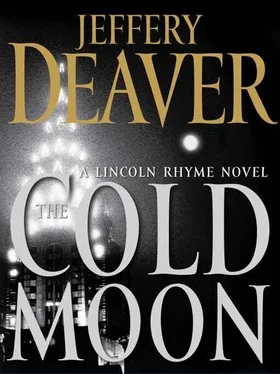And Duncan had known too that the rapist would give up the church under pressure.
"Took a little longer than I thought," said Baker, "but he caved."
"Of course he did," Duncan said. "He's a worm."
Duncan had planned the sick fuck's capture all long; it was necessary to feed the cops the information to make them believe that the Watchmaker was a vengeful psychopath, not the hired murderer he actually was. And Vincent was key to pointing the police in the right direction for the completion of Duncan's plan.
And that plan was as elaborate and elegant as the finest timepiece. Its purpose was to halt Amelia Sachs's investigation threatening to unearth an extortion ring that Baker had been running from the 118th Precinct.
Dennis Baker came from a family of law enforcers. His father had been a transit cop, who retired early after he took a spill down a subway station stairwell. An older brother worked for the Department of Corrections and Baker's uncle was a cop in a small town in Suffolk County, where the family was from. Initially he'd had no interest in the profession-the handsome, well-built young man wanted big bucks. But after losing every penny in a failed recycling business, Baker decided to join up. He moved from Long Island to New York City and tried to reinvent himself as a policeman.
But coming to the job later in life-and the cocky, TV-cop style he adopted-worked against him, alienating brass and fellow officers. Even his family history in law enforcement didn't help (his relatives fell low in the blue hierarchy). Baker could make a living as a cop but he wasn't destined for a corner office in the Big Building.
So he decided to go for the bucks after all. But not via business. He'd use his badge.
When he first started shaking down businessmen he wondered if he'd feel guilty about it.
Uh-uh. Not a bit.
The only problem was that to support his lifestyle-which included a taste for wine, food and beautiful women-he needed more than just a thousand or so a week from Korean wholesalers and fat men who owned pizza parlors in Queens. So Baker, a former partner and some cops from the 118th came up with a plan for a lucrative extortion ring. Baker's cohorts would steal a small amount of drugs from the evidence lockers or would score some coke or smack on the street. They'd target the children of rich businessmen in Manhattan clubs and plant the drugs on them. Baker would talk to the parents, who'd be told that for a six-figure payment, the arrest reports would disappear. If they didn't pay, the kids'd go to jail. He'd also occasionally plant drugs on businessmen themselves.
Rather than just taking the money, though, they'd arrange for the victims to lose it in sham business deals, like with Frank Sarkowski, or in fake poker games in Vegas or Atlantic City-the approach they took with Ben Creeley. This would provide the marks with a reasonable explanation as to why they were suddenly two or three hundred thousand dollars poorer.
But then Dennis Baker made a mistake. He got lazy. It wasn't easy finding the right marks for the scam and he decided to go back to some of the earlier targets for a second installment of extortion money.
Some paid the second time. But two of them-Sarkowski and Creeley-were businessmen with pretty tough hides, and while they were willing to pay once to get Baker out of their hair, they drew the line at a second payment. One threatened to go to the police, and one to the press. In early November Baker and a cop from the 118th had kidnapped Sarkowski and driven him to an industrial section of Queens, near where a client of his company had a factory. He'd been shot, the crime staged to look like a mugging. Several weeks later Baker and the same cop had broken into Creeley's high-rise, strung a rope around the businessman's neck and tossed him off the balcony.
They'd stolen or destroyed the men's personal files, books and diaries-anything that might've led back to Baker and his scam. As for the police reports, there was virtually nothing in Creeley's that was incriminating but the Sarkowski file contained references to evidence that a sharp investigator might draw some troubling conclusions from. So one of the people involved in the plan had engineered its disappearance.
Baker thought the deaths would go unnoticed and they continued with their scam-until a young policewoman showed up. Detective Third-Grade Amelia Sachs didn't believe that Benjamin Creeley had committed suicide and started looking into the death.
There was no stopping the woman. They had no choice but to kill her. With Sachs dead or incapacitated Baker doubted that anyone else would follow up on the cases as fervently as she was. The problem, of course, was that if she were to die, Lincoln Rhyme would deduce immediately that her death was related to the St. James investigation and then nothing would stop him and Sellitto from pursuing the killers.
So Baker needed Sachs to die for a reason unrelated to the 118th Precinct crimes.
Baker put some feelers out to a few organized crime wise guys he knew and soon he heard from Gerald Duncan, a professional killer who could manipulate crime scenes and set up fake motives to steer suspicion completely away from the man or woman hiring him to kill. "Motive is the one sure way to get yourself caught," Duncan had explained. "Eliminate the motive, you eliminate suspicion."
They'd agreed on a price-brother, the man wasn't cheap-and Duncan had gone to work planning the job.
Duncan tracked down some loser he could use to feed information about the Watchmaker to the police. Vincent Reynolds turned out to be a perfect patsy, soaking up the story Duncan fed him-about going psycho because of a dead wife and killing apathetic citizens.
Then, the previous day, Duncan had put the plan into operation. The Watchmaker killed the first two of the victims, picked at random-some guy he'd kidnapped from West Street in the Village and murdered on the pier and the one in the alley a few hours later. Baker had made sure Sachs was assigned to the case. There were two more attempted murders by the killer-the fact they didn't succeed was irrelevant; the Watchmaker was still one spooky doer, who needed to be stopped fast.
Then Duncan made his next moves: sending Vincent to attack Kathryn Dance, so that the police would believe that the Watchmaker was willing to kill police officers, and setting up Vincent to be captured and dime the Watchmaker out to the police.
It was now time for the final step: The Watchmaker would kill yet another cop, Amelia Sachs, her death entirely the work of a vengeful killer, unrelated to the 118th Precinct investigation.
Duncan now asked, "She found out you were spying on her?"
Baker nodded. "You called that right. She's one smart bitch. But I did what you suggested."
Duncan anticipated that she'd be suspicious of everyone except people she knew personally. He'd explained that when people suspect you, you have to give them another-harmless-reason for your behavior. You simply confess to the lesser crime, act contrite and they're satisfied; you're off the suspect list.
At Duncan's suggestion, Baker asked some officers about Sachs. He heard rumors that she'd been involved with a crooked cop and he'd ginned up an email from someone in the Big Building and used that as a reason to be spying on her. She wasn't happy, but she didn't suspect him of anything worse.
"Here's the plan," Duncan now explained, showing him a diagram of an office building in Midtown. "This's where the last victim works. Her name's Sarah Stanton. She's got a cubicle on the second floor. I picked the place because of the layout. It'll be perfect. I couldn't put one of the clocks there because the police announced the killer was using them-but I pulled up the time and date window on her computer."
Читать дальше












